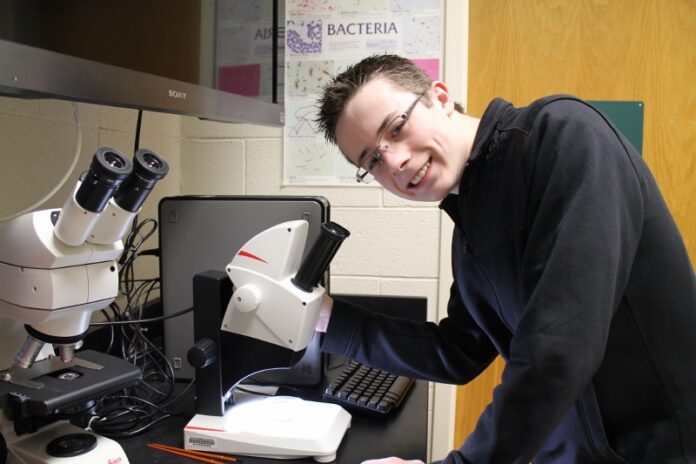
At the Roanoke Valley Governor’s School for Science and Technology, students are charged each year with carrying out a science fair project. Occasionally a student gets so interested in his work that it becomes a multi-year commitment, and that is what happened this year with senior Grant Colip.
When Colip was a sophomore, the city of Roanoke’s landscape coordinator contacted the Governor’s School to offer a research opportunity to students interested in studying organic fertilization. Colip, already an environmental advocate, jumped at the chance and spent weeks studying compost tea, an organic, environmentally-friendly alternative to synthetic fertilizer.
According to Colip, compost tea, a liquid extract of compost that contains plant growth compounds and beneficial microorganisms, gets its name from the process used to create it. “Compost and other nutrients start out dry,” says Colip. “They’re mixed with water, or “brewed,” and allowed to soak, or “steep,” until the mixture is the right consistency to be sprayed onto the soil as liquid fertilizer. The name really does make sense.”
With an uptick in interest in organic fertilization recently, Colip decided to further his study of compost tea this year and use his findings to help the city’s landscape coordinator prepare a comparison of the effects of organic and synthetic fertilization.
Through Governor’s School partnerships with Roanoke City and Appalachian Ecologic, Colip obtained access to the median strip of land at the intersection of Franklin Road and Avenham Avenue for his project and all of the ingredients he needed to make his own compost tea. Colip measured out 15 plots of 5×5 meters, applied his special blend of compost tea fertilizer to some plots and the synthetic fertilizer the city currently uses (UFLEXX) to others, and he monitors the plots through both visual observation and scientific testing. Colip tests his samples in the Governor’s School’s lab, and he has already made some important discoveries.
“So far the research is promising. The compost tea’s grass is taller, it looks healthier, the soil’s nutrient levels are higher, and, after initial set-up charges, it costs less to use than synthetic fertilizer. I am now in the process of assessing the health and biodiversity of the macroinvertebrate and microbial communities in the soil and using that assessment to compare how the two fertilizers affect the ecosystem.” Colip plans to present his findings to Roanoke City Council this spring and hopes to help persuade the council to make the switch from synthetic fertilizer to organic fertilizer for all city landscaping.
To talk with Colip about his efforts to get Roanoke buzzing about his brew – and to talk with the other 269 young scientists about their own exciting, innovative experiments – attend Roanoke Valley Governor’s School’s Student Project Forum! Project Forum is a free, open-to-the-public event that will take place from 1:30-3:00 PM on Saturday, January 31st in the Patrick Henry High School cafeteria.
To learn more about Roanoke Valley Governor’s School, a half-day regional public STEM school for motivated students in grades nine through twelve, please visit the school’s website at www.rvgs.k12.va.us or contact the school’s director, Dr. John Kowalski, or the school’s guidance counselor, Kathy Sebolt, at 540.853.2116.
